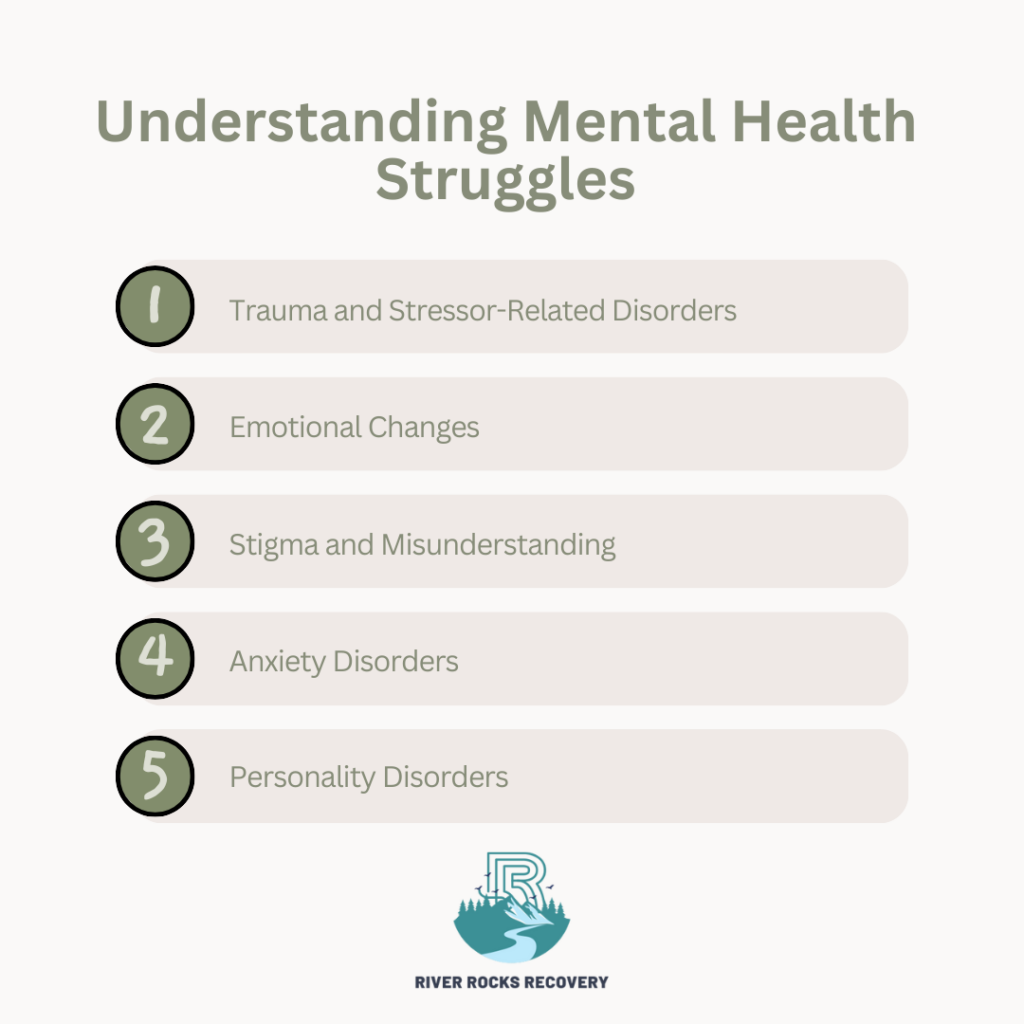Supporting a loved one who is struggling with mental health challenges can be a daunting task, but it is essential for their recovery and well-being. Mental health issues can be complex and deeply personal, often leading to feelings of helplessness or frustration for both the individual and their support system.
If you or your loved one is struggling with mental health issues then it’s time to give them extra care, love, and motivation. Well, we know, it’s not an easy task, but you’ve to do it. At this time, it’s normal to be unclear how to support someone, yet providing the correct assistance can greatly impact their rehabilitation and general well-being.
This blog will provide practical strategies and insights on how to effectively support a loved one facing mental health difficulties, including the importance of seeking professional help through a Mental Health Treatment Center or Addiction Treatment Program.
How Do I Know Your Loved One Is Struggling with Mental Health?
While it may be obvious when someone is going through a difficult period, it is not always easy to determine whether they are experiencing mental health issues. It’s not always necessary to know. Finding out if someone appears distressed and has a diagnosis is not as important as responding to them with empathy.
No two people behave the same when they are ill, even though some mental health conditions have basic symptoms. If you know the person well, you might see changes in their attitude or behavior.
So, if you see your loved one behavior is changing then follow the below tips to give your support and love so they can overcome the situation quickly.
Understanding Mental Health Struggles
Before diving into supportive strategies, it’s crucial to understand that mental health issues can manifest in various forms, including anxiety, depression, bipolar disorder, PTSD, and more. These conditions can affect an individual’s thoughts, emotions, and behavior, making it challenging for them to cope with everyday life. Recognizing the signs of mental health struggles is the first step toward providing effective support:
- Changes in Mood: Look for fluctuations in mood, irritability, or prolonged sadness.
- Withdrawal: A loved one may begin to isolate themselves from friends and family.
- Changes in Sleep Patterns: Insomnia or excessive sleeping can be indicators of distress.
- Altered Eating Habits: Significant changes in appetite or weight can signal emotional issues.
- Difficulty Concentrating: They may struggle to focus or perform daily tasks.

8 Tips to Support Your Loved One Struggling with Mental Health
1. Listen Actively and Non-Judgmentally
One of the most important things you can do is to listen without judgment. Allow your loved one to express their feelings and experiences. Be present and show genuine concern.
- Ask Open-Ended Questions: Encourage them to share by asking questions that cannot be answered with a simple “yes” or “no.” For example, “How have you been feeling lately?”
- Validate Their Feelings: Acknowledge their struggles without trying to minimize their pain. Phrases like “That sounds really tough” can show your support.
2. Encourage Professional Help
Suggesting that your loved one seek professional help is crucial. Mental health therapy is often essential for recovery and can provide tools for coping with their challenges. Here’s how to approach this topic:
- Discuss Options: Talk about different types of mental health treatment available, such as therapy, medication, or a Mental Health Treatment Program.
- Research Together: Offer to help them find a suitable Mental Health Treatment Center or an Addiction Treatment Program if needed. This can include looking into local resources, such as Partial Hospitalization Programs, Intensive Outpatient Programs, or Outpatient Treatment Programs.
3. Educate Yourself About Mental Health
Understanding mental health issues can empower you to provide better support. Read books, attend workshops, or explore online resources to familiarize yourself with their specific challenges. This knowledge can help you empathize and communicate more effectively.
4. Be Patient and Understanding
Recovery from mental health issues is often not a linear process. Your loved one may have good days and bad days. It’s essential to remain patient and provide consistent support, even when it feels frustrating or overwhelming.
- Set Realistic Expectations: Understand that change may take time, and there might be setbacks along the way. Encourage them without putting undue pressure on their progress.
5. Encourage Healthy Habits
Promote healthy lifestyle choices that can positively impact mental health, such as:
- Regular Exercise: Physical activity can improve mood and reduce anxiety.
- Balanced Diet: Nutrition plays a vital role in mental well-being. Encourage meals rich in fruits, vegetables, and whole grains.
- Adequate Sleep: Stress the importance of sleep for mental health. Help them establish a calming nighttime routine.
6. Be There in Times of Crisis
If your loved one experiences a mental health crisis, it’s crucial to know how to respond:
- Stay Calm: Your composed presence can help stabilize the situation.
- Listen and Offer Support: Let them know they are not alone and that you are there to help.
- Seek Immediate Help: If they are in danger of hurting themselves or others, contact emergency services or a crisis hotline immediately.
7. Encourage Participation in Support Groups
Support groups can provide a sense of community for those struggling with mental health issues. Encourage your loved one to participate in peer-led groups or therapy groups, as these environments can help normalize their experiences and foster connections with others facing similar challenges.
8. Consider Professional Support for Yourself
Supporting someone with mental health challenges can be emotionally taxing. Consider seeking support for yourself through therapy or support groups. Understanding your feelings and getting guidance on how to navigate this experience can help you remain a strong source of support for your loved one.
Looking for Professional Help? Call River Rocks Recovery!
Addiction or mental health issues aren’t easy to deal with. But you don’t need to put stress on it. We at River Rocks Recovery offer expert, caring support that is customized to meet your individual needs. Our professionals are here to help. Give River Rocks Recovery a call right now at: (888) 905-6281!
Conclusion
Supporting a loved one struggling with mental health issues is a critical role that requires compassion, patience, and understanding. By listening actively, encouraging professional help, and promoting healthy habits, you can play a significant part in their journey to recovery.
If your loved one requires specialized help, consider reaching out to an Addiction Treatment Center in Ohio that offers comprehensive Addiction Therapy Programs, including Alcohol Addiction Treatment and Drug Addiction Treatment. At River Rocks Recovery, we are dedicated to providing the support and resources needed for healing. Together, we can navigate the complexities of mental health and help your loved one find their path to recovery.
FAQ on Support a Loved One Struggling with Mental Health
How can I recognize if a loved one is struggling with mental health?
Signs of mental health struggles include changes in mood, withdrawal from social interactions, altered eating or sleeping patterns, and difficulty concentrating. If you notice these changes, it may be time to reach out and offer support.
What should I say to a loved one who is struggling?
Approach them with empathy and listen actively. Use open-ended questions to encourage them to share their feelings, and validate their experiences without judgment. Phrases like “I’m here for you” can also be comforting.
How can I encourage my loved one to seek professional help?
Discuss the benefits of professional mental health treatment and offer to help them research options like therapy, medication, or support groups. Reassure them that seeking help is a sign of strength, not weakness.
What are some healthy habits I can encourage?
Encourage regular physical activity, a balanced diet, sufficient sleep, and mindfulness practices like meditation or yoga. These habits can significantly improve mental well-being.
What should I do in a mental health crisis?
Stay calm and listen to your loved one. If they are in danger of harming themselves or others, contact emergency services or a crisis hotline immediately for professional assistance.
Where can I find additional resources for mental health support?
Consider reaching out to River Rocks Recovery for access to Mental Health Treatment Programs, and comprehensive Addiction Treatment Programs tailored to individual needs.




























